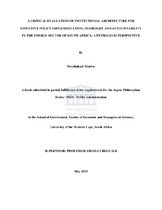A critical evaluation of institutional architecture for effective policy implementation, oversight and accountability in the energy sector of South Africa: a petroleum perspective.
Abstract
Coordination, Collaboration, and Cooperation, (C04); Community (C01) Driven Development (D2) minus Historical Institutionalisation (HI) is equal to Policy Implementation Effectiveness (PIE), is recommended by the researcher to improve results. Trends in compiled data were analysed with regards to legislative oversight and accountability in the petroleum industry, using the OECD/ DAC evaluation criteria. In terms of relevance, effectiveness, and efficiency, the researcher discovered a partial link between the activities performed by parliamentarians representing the petroleum industry where HDSA transformation is concerned. It was concluded that electrical energy generation and distribution throughout the five-year period drew more focus in terms of oversight than on other sectors. It was further noted that oversight and accountability could have been applied more efficiently if input were linked to policy objectives and activities. This resulted in only partial or limited HDSA transformation in the petroleum industry. When it comes to sustainability the researcher argued that despite the apparent long-term stability of parliamentary activities, such stability may not translate to sufficient oversight and accountability to ensure sustainable transformation in the petroleum industry. It was concluded that while oversight and accountability was being applied to one specific arena, other areas in need of transformation did not receive sufficient, or indeed any, legislative oversight. The facilitation model: Communication, Coordination, Collaboration, and Cooperation, (C04); and Community (C01) Driven Oversight and Accountability (D1OA) is recommended by the researcher to improve effective oversight and accountability. Thus, Effective (A + O) = C04 + C01 /D1OA equals to (A + O)e = C205 / D1OA.

